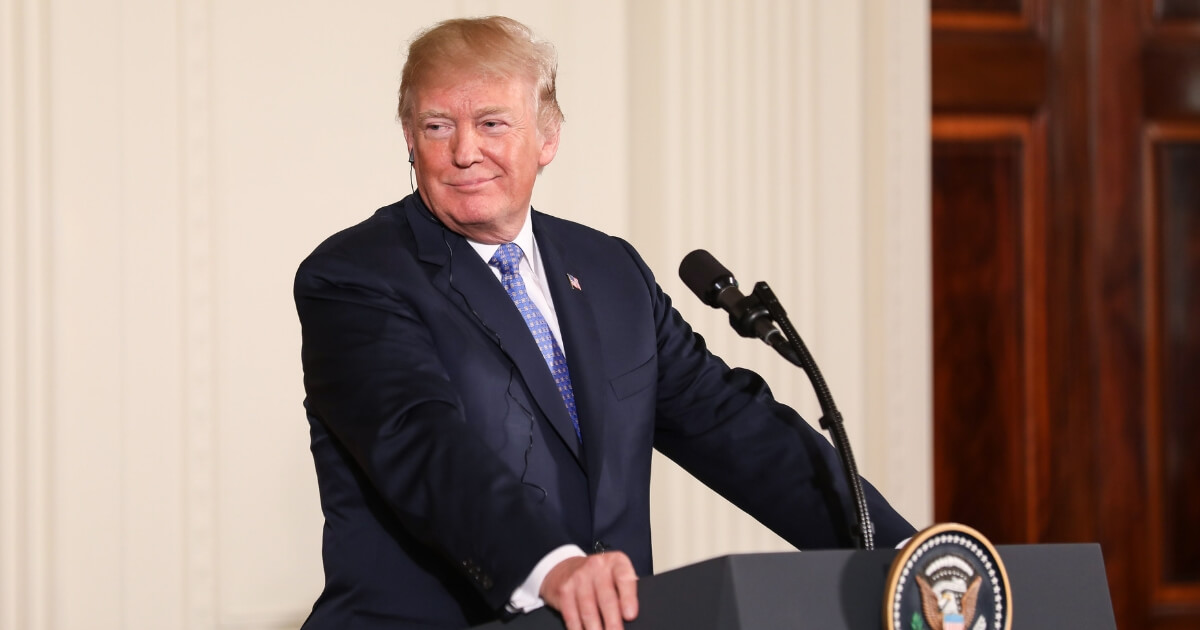
There are those who believe that The New York Times is biased against President Donald Trump. Some would even say it is a source of “fake news.”
To them, this gem from The New York Times may come as quite the shocker. In a tweet referring to an article they published, The New York Times actually gives Trump some credit for a smart policy move:
When Trump announced the U.S. would withdraw from the Iran deal, experts feared it would hurt the economy and leave Iran free to restart its nuclear program. But, so far, the policy has been effective without either of those consequences. https://t.co/vIRLdv4gSd
— The New York Times (@nytimes) September 19, 2018
In the article, they note that there were two particular concerns when Trump announced a withdrawal from the Iran nuclear deal.
“If Mr. Trump’s approach worked too well, oil prices would spike and hurt the American economy. If it failed, international companies would continue trading with Iran, leaving the Islamic Republic unscathed, defiant and free to restart its nuclear program.”
TRENDING: Sex Story Backfiring. Dems Get Bad News from RINO Vital To Stopping Kavanaugh
They go on to state that “the policy has been effective without either of those nasty consequences, at least so far.” They have come to the conclusion that Trump was right, “so far,” based on certain observable factors.
First, oil prices. “Remarkably, the price of oil in the United States has risen only modestly while gasoline prices have essentially remained flat. The current global oil price hovers around $80 a barrel, $60 below the highs of a decade ago.”
This may be related to the fact that Iran’s own exports are declining. Even oil companies in counties that still want to work with Iran on the nuclear deal have been “bailing out of deals with Tehran.”
According to CNBC, French energy giant Total CEO Patrick Pouyanne said, “Large energy companies cannot risk doing business in Iran in light of U.S. sanctions on the country.”
Was President Trump right to pull the U.S. out of the Iran Nuclear Deal?
He told CNBC, “There’s not a single international company like Total who can work in any country with secondary sanctions. I don’t have the right. It’s just the reality of the world. The reality is that the capital of the world today is in the hands of the U.S.”
“Is it right that in this world the U.S. (is) using that … to impose some rules for other countries? That’s a debate.”
Total is not the only company that sees working with Iran without a waiver from the U.S. wouldn’t make financial sense. The New York Times wrote, “The Foundation for Defense of Democracies, a conservative Washington think tank, found that 71 foreign companies planned to withdraw from Iran, 19 intended to stay and 142 were undecided or hadn’t said as of early September.”
The foundation’s director of research, David Adesnik, explained, “Big international companies have to ask themselves what risks are they willing to take on. Even if you don’t have a business in the U.S. you can be cut off from our financial system, and that’s not something a truly global firm can afford.”
Pouyanne told CNBC why the U.S. held the cards when it came to international trade with Iran. “The U.S. could decide that I could not have access to any U.S. financing. It’s impossible, let me be clear, to run an international company like Total without having access to U.S. financing or to U.S. shareholding.”
RELATED: Rubio Unloads on Kerry over Meeting With Iranian Officials, Demands Answers from DOJ
As an example of how devastating a refusal of U.S. financing could be to an international company, he shared data on Total’s financing situation. The numbers are eye-opening.
CNBC reported, “U.S. banks are involved in about 90 percent of the company’s financing operations, while American investors account for more than 30 percent of its shareholding. The company has more than $10 billion deployed in U.S. operations.”
“By comparison, Total spent less than 40 million euros, or roughly $46 million, on its project developing the massive South Pars natural gas field in Iranian waters.” Other international companies may have similar circumstances, which would explain why so many are now playing ball with the U.S. on the Iran sanctions.
So, America is winning, yet again, thanks to Trump. Some credit his “4D chess skills,” but others would simply point to “the Art of the Deal” and his many decades of experience on the international business front as the reason why his strategy is working so far.
We are committed to truth and accuracy in all of our journalism. Read our editorial standards.
via Conservative Tribune
Enjoy this article? Read the full version at the authors website: https://www.westernjournal.com/ct
